UNWRA | Gaza in 2020: A liveable place?
The broad objectives of this study were to: highlight the longer-term effects and implications of current developmental and social trends and challenges affecting the Gaza Strip; raise awareness of these both locally and internationally; and, inform the strategic programming of the UN.








